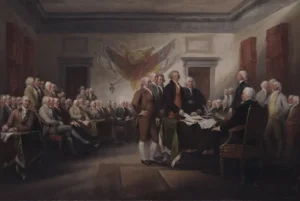“I pledge allegiance to the Flag of the United States of America, and to the Republic for which it stands, one nation under God, indivisible, with liberty and justice for all.”
Summary
The U.S. government is a constitutional republic, as mandated by Article IV, Section 4 of the Constitution, which guarantees each state a republican form of government. James Madison, in Federalist No. 39, elaborates that a republic is a government deriving its powers from the people and administered by elected officials. There is often confusion between the terms “democracy” and “republic.” A pure democracy involves direct participation of all citizens in decision-making, as seen in ancient Athens, whereas a constitutional republic, like the United States, relies on elected representatives constrained by a constitution that delineates the separation of powers and protects individual rights. Madison further distinguishes between a pure democracy, prone to instability and factionalism, and a republic, which through representation, can more effectively manage these issues, promising greater stability and justice. The controversy over calling the U.S. a democracy versus a republic may stem from a misunderstanding of these forms of government or it might be intentional politicization.
Form of U.S. Government
Article IV, Section 4 of the Constitution states, “The United States shall guarantee to every State in this Union a Republican Form of Government…”
In Federalist No. 39, James Madison elaborates on the nature of the U.S. government, affirming it as a republic: “If we resort for a criterion to the different principles on which different forms of government are established, we may define a republic to be, or at least may bestow that name on, a government which derives all its powers directly or indirectly from the great body of the people, and is administered by persons holding their offices during pleasure, for a limited period, or during good behavior.”
Are we a Democracy or a Republic?
There appears to be a controversy about whether America is a Democracy or a Republic. The media keeps calling us a Democracy, but somehow, we just don’t fully recognize that. Are we just embarrassingly naive?
There is, in fact, a distinction. So, is America a Republic, or more specifically, a Constitutional Republic, or is it a Democracy?
The terms “democracy” and “constitutional republic” refer to different frameworks for organizing government and influencing how power is exercised and constrained.
A Democracy generally refers to a system of government where power is vested in the people and exercised directly by them or by their elected representatives. In a pure or direct democracy, citizens directly participate in all decision-making processes. This was practiced in ancient Athens, around the 5th Century BC, where citizens voted on laws and policies themselves rather than through representatives.
In Athens, the primary legislative body, the Assembly (Ekklesia), was open to all male citizens over the age of 18. The Assembly was the central decision-making body where citizens would gather to discuss and vote on various issues, including laws, war, and public policy. Meetings were held on the Pnyx, a hill in Athens, and could attract thousands of citizens. The Boule (Council of 500) set an agenda for the Assembly, which prepared topics for discussion and proposed preliminary decrees. This representative body was chosen by a lot from the citizenry and served for one year. The Boule handled much of the day-to-day administration and prepared matters to be brought before the Assembly. During this meeting, citizens could give speeches and debate the issues on the agenda. Voting was typically done by a show of hands, although other methods, such as using different colored stones or pottery shards (ostraka), could be used for specific purposes, like ostracism—a process to exile a citizen for ten years. Citizens also participated in large jury courts, where randomly selected jurors (which could number in the hundreds) would vote on legal cases. Voting in these courts was typically done by secret ballot to indicate guilt or innocence.
This direct form of democracy allowed citizens to influence Athens’s governance significantly, unlike the representative democracies common today. It should be noted that there are no pure or direct democracies today, and most of the historical democracies were terminated by military interventions. Also of note is that the Boule was chosen by lot rather than elected and served a term limit of one year.
A constitutional republic is a form of government in which the people elect officials to represent them, but a constitution constrains their powers. The Constitution includes a separation of powers among different branches of government (executive, legislative, and judicial) to prevent any branch from gaining too much power, and both the government and its citizens are subject to the law. The Constitution serves as the supreme law, detailing how government functions, enumerating individuals’ rights and limiting government officials’ powers. Finally, officials are elected to make decisions and enact laws on behalf of the people. However, again, their powers are explicitly limited by the Constitution.
The United States is a constitutional republic because it operates under the framework of a constitution that limits the powers of government and officials. Elected representatives exercise power. The Constitution delineates the structure of government and the powers of different branches and includes a Bill of Rights to protect individual liberties. Uniquely, a constitutional republic incorporates a robust framework of laws and checks to balance the power of the government and protect individual rights.
In Federalist No. 10, James Madison draws a distinction between a pure democracy and a republic.
“A pure democracy, by which I mean a society consisting of a small number of citizens who assemble and administer the government in person, can admit no cure for the mischiefs of faction. A common passion or interest will, in almost every case, be felt by a majority of the whole; a communication and concert result from the form of government itself; and there is nothing to check the inducements to sacrifice the weaker party or an obnoxious individual. Hence it is that such democracies have ever been spectacles of turbulence and contention; have ever been found incompatible with personal security or the rights of property; and have in general been as short in their lives as they have been violent in their deaths. Theoretic politicians, who have patronized this species of government, have erroneously supposed that by reducing mankind to a perfect equality in their political rights, they would, at the same time, be perfectly equalized and assimilated in their possessions, their opinions, and their passions.”
“A republic, by which I mean a government in which the scheme of representation takes place, opens a different prospect, and promises the cure for which we are seeking. Let us examine the points in which it varies from pure democracy, and we shall comprehend both the nature of the cure and the efficacy which it must derive from the Union.”
Madison goes on to explain how a republic, through its system of representation, can better control the effects of factions and provide a more stable and just government. This distinction is a core argument in Federalist No. 10, emphasizing the advantages of a republic over a direct democracy.
Is the Controversy Semantics or Nefarious?
There are any number of possible governmental configurations. We could have a representative democracy that glorifies professional elites; let’s call them politicians. We can also avoid any term limits as that would certainly attract individuals who could really profit emotionally and financially from their stints of service. Maybe eradicate the separation of power constraints, especially concerning the judicial branch. Let’s go from 9 jurors to perhaps 21 or stack it somehow to agree more with the valid majority and democratic viewpoint. Oh, and if we could also eliminate those pesky restrictions improperly imposed upon the majority view by the Constitution; especially that overplayed and archaic Bill of Rights. Of course, all those nice gentlemen from El Salvadore will only increase the democratic majority.
That sounds about right—the U.S. Democracy of the 21st Century. Now it’s becoming more evident…







